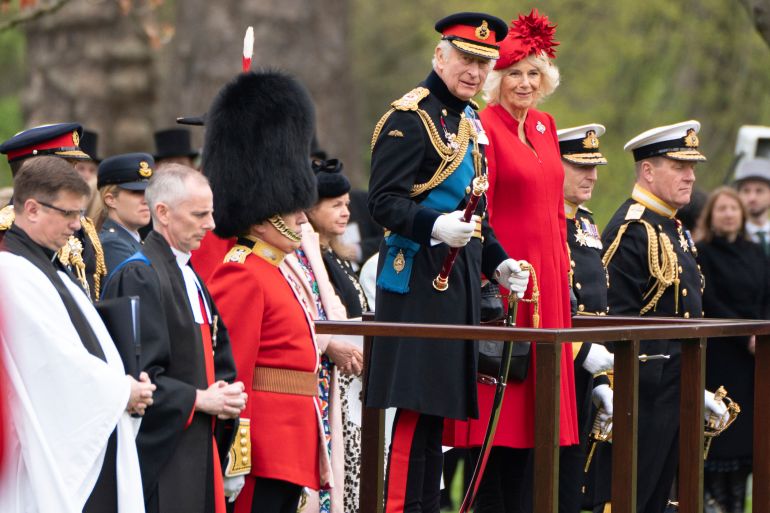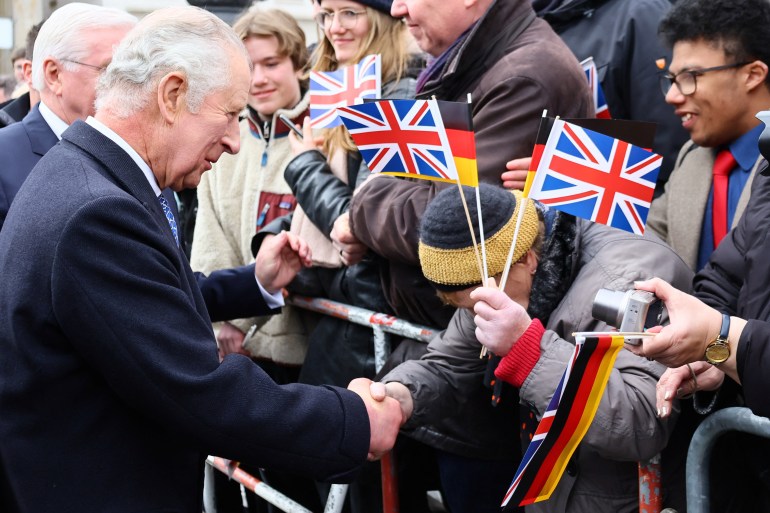‘King Charles will be inaugurated at a time when Empire is gone’
The differences in the coronations of King Charles and his mother highlight the changing role of Britain’s monarchy.

On Saturday, May 6, Britain’s King Charles III will be crowned, eight months after he ascended to the throne, following the death of his mother, Queen Elizabeth II, last September.
Officiated by the archbishop of Canterbury, the highest Church of England cleric in the country, the ceremony will be held at Westminster Abbey in London, the setting for every coronation since 1066.
Keep reading
list of 2 itemsBritish Asians reflect on Empire before King Charles’s coronation
The coronation will see the 74-year-old crowned with a solid gold crown made in 1661 in front of 2,200 invited guests from across the political, royal and celebrity worlds.
Among them will be his eldest son Prince William and his wife Catherine, while his second son Prince Harry, who recently fell out with the rest of the family, will be flying in for the event from the United States without his wife Meghan Markle.
It is still not clear what role Prince Andrew, recently stripped of royal duties amid his links to a sex abuse scandal, will play.
The guest list also includes British Prime Minister Rishi Sunak, French President Emmanuel Macron, German Chancellor Olaf Scholz and Ursula von der Leyen, the president of the European Commission, plus a number of other royal families, including Prince Albert II and Princess Charlene of Monaco.
Previous coronation
Charles’s coronation comes 70 years after the coronation of his mother, then aged 25, who was crowned in a grand ceremony on June 2, 1953.
The 39th monarch’s coronation ceremony at Westminster Abbey was steeped in religious pomp, symbolism and tradition as millions watched watch Queen Elizabeth II recite an oath, was anointed with holy oil and adorned with riches, robes and royal regalia as she was crowned Queen of the United Kingdom, Canada, Australia, New Zealand, South Africa, Pakistan and Sri Lanka, known at the time as Ceylon.

Saturday’s ceremony appears to be a less grand affair, with a shortened ceremony from about three hours to an hour and a reduced attendee list.
Commentators told Al Jazeera that the differences speak to the changing role of the royal family and Britain as a nation domestically and on a global stage between the two events.
Ed Owens, a historian, royal commentator and author of The Family Firm: Monarchy, Mass Media and the British Public, 1932-53, told Al Jazeera: “In 1953, there was a genuine sense of enthusiasm, optimism and hope that signalled a new start for Britain in the aftermath of the Second World War. The coronation was presented as the party that was going to kick start a new period.”
“There has been so much time between the two coronations and the tone of this correlation is about justification as to why it should go ahead, in particular to a younger audience, and explaining the religious symbolism to a nation that’s no longer a Christian majority.”
Edward Kissi, an associate professor in the Department of African Studies at the University of South Florida, told Al Jazeera that a comparison can be seen between the grandness of the national and global fanfare in 1953 compared with a more tepid pre-event atmosphere now.
“Context is important here,” he said. “Queen Elizabeth was coronated at the endpoint of the British Empire, and the waning days of Britain’s global influence. King Charles will be inaugurated at a time when the Empire is gone, and the Commonwealth that replaced it is uncertain about its attachment to and reverence for Britain and its soon-to-be-coronated monarch.”
Guest list
A key difference is the number of people due to attend. In 1953, the guest list boasted more than 8,000 people and 129 nations and territories were represented, including General George Marshall, the former US secretary of state, and the prime ministers of India and Pakistan, Jawaharlal Nehru and Mohammad Ali Bogra.
Comparatively, attending the king’s coronation on behalf of India will be Vice President Jagdeep Dhankhar while President Joe Biden’s wife Jill Biden will be the highest-ranking US official.
Khadiza Naufa Fatin, an independent researcher and editor with the Heritage Times based in Guwahati in the northeast Indian state of Assam, told Al Jazeera that the differences in the events reveal much about the new world order.
“The event in 1953 was very close to the aftermath of World War II and the consequential independence of several colonies,” she said.
“At that time, former colonies and their leaders still felt relatively closer in terms of the memory of an empire that once ruled them. As new nation-states were forming, they hadn’t yet distanced themselves from the monarchical system and a monarch was seen as a necessary symbol to hold the state together. People therefore looked towards Queen Elizabeth II for hope and peace in the economic and political turmoil,” Naufa Fatin added.
“The very different contexts surrounding the relationship between the British monarchy and the parts of the world that were once part of its empire colour the contrasts between 1953 and 2023,” said Matthew Smith, professor of history and director of the Centre for the Study of the Legacies of British Slavery at the University College London (UCL).
“In those seven decades, there have been profound achievements in the project of decolonisation that have resulted in complex systems of nationalism in Africa, the Caribbean, Asia, and even in Britain itself, which today looks demographically very different from what it did in 1953. What this has meant is that the receptivity to the King’s coronation will include a rather interesting illustration of how much we have progressed,” he said.
Amid some of the wider shifts within decolonisation discussions around goods and artefacts taken from former colonies, the monarchy announced earlier this year that the disputed Kohinoor diamond, or a replica of it, will for the first time not feature in a coronation ceremony.
“There is today a much stronger public consciousness about how Britain made its wealth and the narratives of exploitation through slavery and colonialism are more widely known and acknowledged,” Professor Smith said.
“The Church of England, private institutions and families have in the past three years issued very public apologies for their roles in slavery and African enslavement. These developments are not lost on the crown,” he added.
“I would like to imagine that the king himself, as he considers his reign, must appreciate how the horrors of the past cannot go unremarked, unacknowledged or without repair and gestures such as the adjustments to the queen consort’s crown may be but one small indication of that,” Smith said.
“Currently, the monarchy in Britain seems more like a relic of the past. So in some ways, people see this event as a tradition rather than a political necessity,” said Naufa Fatin.
“Even domestically, people of Britain have never felt more distant from the royal family than now. They can’t relate to the existence of a household that is holding onto the stories of its past glories to stay relevant politically. The British royal family is no longer what it used to be but rather one of the royal families across the globe. Earlier, in the anglophone world, their power was a default that we all understood but it is now changing,” she added.
The 1953 coronation was the first British coronation to be fully televised in the UK, with a reported 27 million domestic viewers, and the second key world event to be broadcast internationally on television, following the inauguration of US President Dwight Eisenhower a few months earlier.
Analysts say that despite the changes and controversies, the coronation looks set to be an international media spectacle.
“In an age of social media, thousands more, even millions, can ‘attend’ the coronation from a distance, and indirectly by watching their television sets,” said Professor Kissi.
“The coronation is likely to be a media spectacle of the 21st century that will outclass that of 1953.”